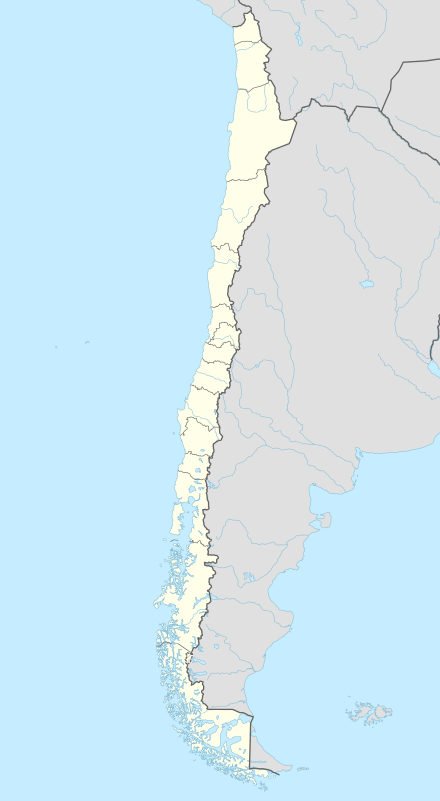Guafo Island
| Native name: <span class="nickname" ">Isla Guafo | |
|---|---|
 Guafo Island lighthouse | |
 Guafo | |
| Geography | |
| Coordinates | 43°35′35″S 74°42′49″W / 43.593029°S 74.713481°WCoordinates: 43°35′35″S 74°42′49″W / 43.593029°S 74.713481°W |
| Adjacent bodies of water | Pacific ocean |
| Area | 300 km2 (120 sq mi) |
| Administration | |
| Region | Los Lagos |
| Province | Chiloé Province |
| Commune | Quellón |
| Demographics | |
| Population | 4 |
| Additional information | |
| NGA UFI= -883559 | |
Guafo Island is an island located southwest of Chiloé Island and northwest of Chonos Archipelago, Chile. This island has some 260 square kilometres (26,000 ha) of timber estimated in 2000 to be worth $21 million USD. There are many hills, valleys and streams on the island. The ocean currents have a way of depositing an abundance of fish in this area which makes it one of the most productive marine areas in the Southern Pacific Ocean. Because of this numerous marine vertebrates such as fur seals, sea lions and penguins reproduce and feed in the area. The prevailing west winds and the location make this a rainy, stormy place.
Biodiversity
Guafo Island is characterized by a high biodiversity that includes the largest breeding colony of South American fur seals (Arctocephalus australis) on Chilean coasts,[1] a large population of South American sea lions (Otaria byronia), and a reproductively active population of marine otters (Lontra felina), a critically endangered species. Recently the coasts of the island have been indicated as an important feeding area of blue whales (Balaenopteramusculus), Southern right whale (Eubalaena australis), humpback whales (Megaptera novaeangliae) and transient killer whales (Orcinus orca). Among seabird highlights is the largest breeding colony of sooty shearwater (Puffinusgriseus) in the world (Reyes-Arriagada et al. 2007[2]) as well as important nesting sites of Magellanic penguins (Spheniscus magellanicus) and occasional sightings of Humboldt penguins (Spheniscushumboldti). Historical data also shows that the Island was within the itinerary of the Beagle in 1835. Guafo Island has been considered within areas that are critical for marine conservation by the Wildlife Conservation Society (WCS) and the World Wildlife Fund (WWF)
Lighthouse
The lighthouse was built 1907 by[3] George Slight and its rotating 4-man crews who serve 4 months on station is the only permanent population in the island. The lighthouse itself is only 8 meters tall, but the light is 144 meters above the sea.
Climate
| Climate data for Guafo Island | |||||||||||||
|---|---|---|---|---|---|---|---|---|---|---|---|---|---|
| Month | Jan | Feb | Mar | Apr | May | Jun | Jul | Aug | Sep | Oct | Nov | Dec | Year |
| Average high °C (°F) | 15.1 (59.2) |
15.3 (59.5) |
14.9 (58.8) |
13.4 (56.1) |
12.1 (53.8) |
10.8 (51.4) |
10.3 (50.5) |
10.2 (50.4) |
10.3 (50.5) |
10.7 (51.3) |
11.8 (53.2) |
13.1 (55.6) |
12.3 (54.1) |
| Daily mean °C (°F) | 12.5 (54.5) |
12.6 (54.7) |
12.0 (53.6) |
10.8 (51.4) |
9.4 (48.9) |
8.2 (46.8) |
7.5 (45.5) |
7.3 (45.1) |
7.4 (45.3) |
8.3 (46.9) |
9.5 (49.1) |
11.0 (51.8) |
9.7 (49.5) |
| Average low °C (°F) | 9.6 (49.3) |
9.4 (48.9) |
8.8 (47.8) |
7.3 (45.1) |
6.3 (43.3) |
5.4 (41.7) |
4.7 (40.5) |
4.6 (40.3) |
4.5 (40.1) |
5.4 (41.7) |
6.6 (43.9) |
8.0 (46.4) |
6.7 (44.1) |
| Average precipitation mm (inches) | 88.0 (3.465) |
88.9 (3.5) |
115.0 (4.528) |
147.0 (5.787) |
211.7 (8.335) |
193.7 (7.626) |
189.2 (7.449) |
189.4 (7.457) |
137.2 (5.402) |
104.0 (4.094) |
102.5 (4.035) |
102.5 (4.035) |
1,669.1 (65.713) |
| Source: Meteorología Interactiva[4] | |||||||||||||
References
- ↑ Pavés, Héctor J.; Schlatter, Roberto P. "Temporada reproductiva del lobo fino austral, Arctocephalus australis (Zimmerman, 1783) en la Isla Guafo, Chiloé, Chile". Revista chilena de historia natural. 81 (1): 137–149. doi:10.4067/S0716-078X2008000100011. ISSN 0716-078X.
- ↑ Reyes-Arriagada, Ronnie; Campos-Ellwanger, Paulo; Schlatter, Roberto P.; Baduini, Cheryl (2006-01-01). Hawksworth, David L.; Bull, Alan T., eds. Sooty Shearwater (Puffinus griseus) on Guafo Island: the largest seabird colony in the world?. Springer Netherlands. pp. 87–104. doi:10.1007/978-1-4020-6320-6_6. ISBN 978-1-4020-6319-0.
- ↑ Russ Rowlett, Lighthouses of Southern Chile, University of North Carolina at Chapel Hill
- ↑ "Información climatológica de estaciones chilenas-Chile Sur" (in Spanish). Retrieved September 6, 2012.
External links
- Rowlett, Russ. "Lighthouses of Southern Chile". The Lighthouse Directory. University of North Carolina at Chapel Hill.
- Faro Isla Guafo, Chile